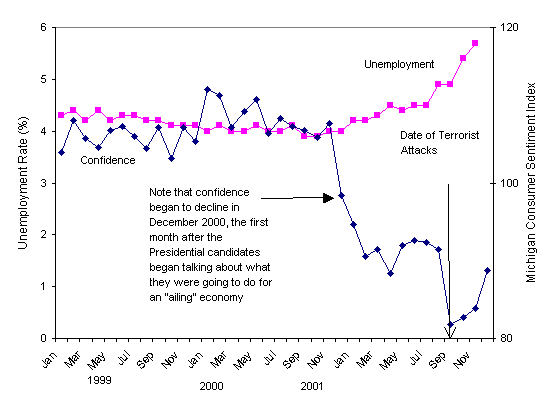| Much has been written about the macroeconomic consequences
of the tragedies in New York, Washington and Pennsylvania, and most of
this has to do with shattered consumer confidence and the consequent reduction
in spending. There are two common measures of consumer confidence, both
indexes updated on a monthly basis. One is produced by the Consumer Confidence
Board, a non-profit business group; the other is an index produced
each month by the Universioty of Michigan. Both indexes are constructed
in part from reponses to survey questions. Without a doubt, consumer confidence
fell, and unemployment rose sharply, in the aftermath of the attacks. But
the economic consequences should also be put into perspective: consumer
confidence had already fallen, dramatically, and unemployment had already
risen, in the months preceding the attacks. The economy was already in
a recession. |

|
|
The Recession of 2001-2002. Note that consumer
confidence began fa lling, and unemployment began rising, at the beginning
of 2001. Yes, the terrorist attacks on the United States did further damage
to conifdence, but they exacerbated, rather than initiated, the recession.
|
| Nonetheless, from the perspective of our analysis, the
exact timing of the onset of the recession of 2001-2 is not important.
At some point early in 2001, confidence fell, causing a reduction in consumer
spending (and investment) for any given interest rate. That is, the IS
curve shifted to the left. The government response is either (i) increase
the money supply, lowering interest rates, and inducing a countervailing
shift in the LM curve; (ii) raise government spending and cut taxes to
shift the IS curve back from whence it came, or (iii) do both. Brad de
Long suggests that both might be necessary. His arguments should remind
you of recent debates about government policy in Japan. |
